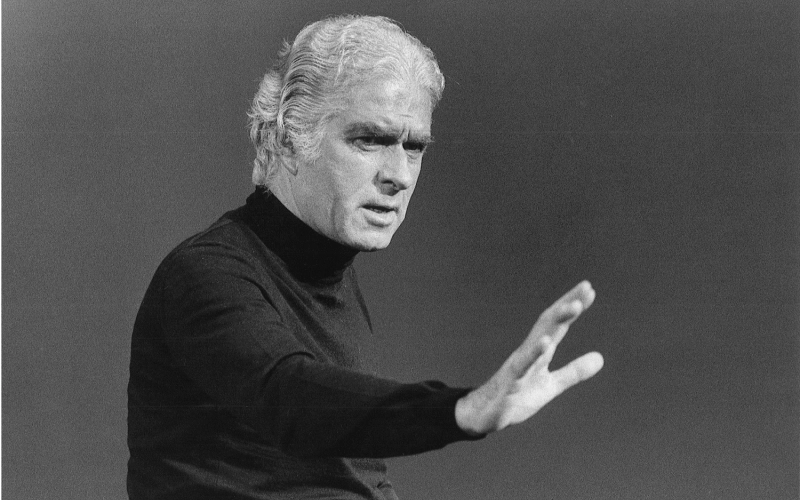January 1984, the Théâtre de l'Europe desired by Giorgio Strehler - director of the Piccolo Teatro in Milan - and the French government, was just a few months old. In the editorial of the first issue of Theatre in Europe magazine, the Italian director discusses the reasons that led him to want a European theatre, and the need for a European cultural fraternity.
We are well aware that we are living in a difficult time for the European institutions: so we are not just sending out random signals. As a matter of fact, it is clear to us that Europe might come into being by resting not only on political or economic bases, but also on the reality and the prospect of a dialectical encounter between the intellectual and cultural forces that it has been nurturing for centuries, beyond borders, over and above the bloodstained history of our continent, so as to flesh out the portrait of European mankind.
The idea of a European theatre has a long story: it harks back to the ceaseless, inspiring journeys of the great companies of the Commedia dell'Arte whose very names - The Fiery, The United, The Faithful – sound as a program in their own right, the symbol of a certain will and of a certain love.
Today, this project from our past is once again renewed for us, thanks to the generous action of the French government and of Jack Lang, who have shared our intention to bring to life an idea that called for confidence and support.
France, that ever-beating heart of Europe, has created with us this forum for exchanges, for relationships – not a mere festival or meeting point, but an actual place: the Théâtre de l'Odéon in Paris, where all the people involved in the making of theatre, in all their diversity, who too often know each other from afar, can develop their work with a fraternity of intentions that does not preclude variety or even aesthetic disagreement.
We are not afraid of difference, as long as it is pure, and more than a mere flash in the pan. We believe that Europe is beautiful because it brims with contradictions, because it is dialectical and made up of different voices and sounds, filling each other's gaps. That is why we believe that European directors, actors, decorators and technicians - in a word, all the people who « make the show » - should feel concerned by the scope of the project and realize that this theatre also also belongs to them.
Theatre of Europe: a place where reciprocal cultural gaps are compensated, where different points of view on the culture of different countries are represented, with the kind of aesthetic consistency that only comes from the sincerity and poetry of human beings as expressed through the different personality of the creators and protagonists who walk in the footsteps of the poets that Europe has produced over the centuries and keeps on producing. This offered meditation on poetry and truth should help our community to live more intensely and better understand itself. We have always considered theatre to be a moral institution, a responsible act: the Theatre of Europe will not renounce this principle.
All of mankind's great ideas contain some element of Utopia. Utopia is part of reality, dream is part of reality: and this idea of a Theatre of Europe meant for Europe, which already exists in our hearts but not yet in institutions, has its fair share of Utopia. But it is the Utopia of fraternity, the one that transcends our customs, our languages, in order to tell us that we are all human beings, who conceive, who experience similar ideas and feelings whenever they manage to break down this illusory wall behind which every one of us believes he can be safe, and which generates an ever more desolate, ever more ice-cold loneliness.
Today, if someone should ask us if this theatre of a Europe that is yet to be born is really necessary [...], our answer would be: we must build houses, institutions, defend them and believe in them in times when huge earthquakes are shaking the earth and everything seems to be lost forever.
Building and rebuilding on safe, solid ground is easy: to do so, again and again, is a necessity wherever destruction threatens, and today more than ever, in times when the ultimate disaster is looming.
A theatre [...] in a Europe of our dreams, on a shattered planet where terror and violence hold sway in the days of atomic madness, what could be more useless?
Or more necessary to defend, even in the smallest way, the existence of mankind?
